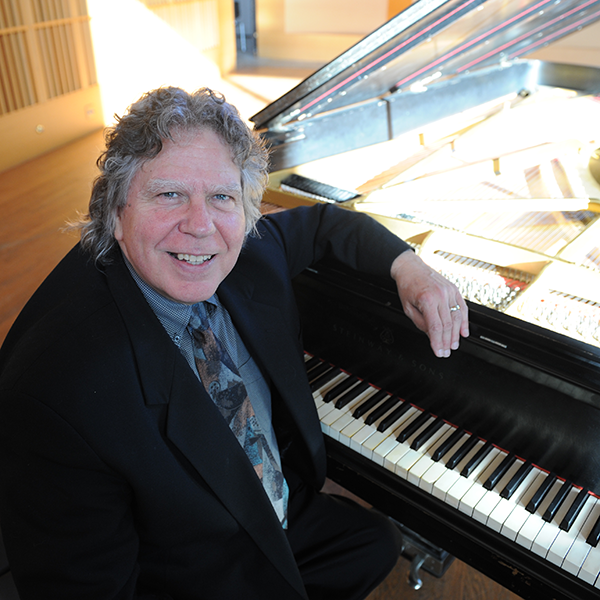Circular 14: The Apotheosis of Aristides | An Oratorio
About the composer
Neely Bruce is the John Spencer Camp Professor of Music at Wesleyan University. He is the composer of over 800 works, including operas, oratorios and other choral music, orchestral works, solo songs, seven documentary scores for public television, and some 14 hours of solo piano music. His most recent major work is a dramatic oratorio entitled Circular 14: The Apotheosis of Aristides.
Performance history of the work
On January 27, 2018, the first performance of the piece in its definitive version with full orchestra was held. This event took place at the Mormon Tabernacle in Salt Lake City, UT. Previously, the complete work was performed, but with a small chamber group, on January 24, 2016. That event was held at the American Jewish University in Los Angeles, and is the version presented on the videos seen here. Additionally, highlights from the work were performed in New York and Washington.
Artist statement by Neely Bruce
Late in the fall of 2010 I began a serious investigation of the life and accomplishment of Aristides de Sousa Mendes. The goal of my research was the composition of a dramatic oratorio, an opera of the mind, so to speak, for which I would also write the text. In the intervening five years I read everything about him I could put my hands on, and traveled to sites related to his career in France and Portugal. Over and over, in my mind I returned not only to Aristides’s singular accomplishment, but also to Circular 14 — the brutally restrictive document issued by the dictator Salazar that basically meant ‘No visas to Portugal.’ Like most of my large works, it is eclectic in the extreme, incorporating elements of free chromaticism, pandiatonicism, polytonality, spatial effects for two choruses, and evocations of Portuguese folk music. There is even some faux Beethoven, which I imagine performed by Aristides’s daughter Clotilde.
While writing this piece, Aristides de Sousa Mendes has become far more to me than the subject of this work. He has become my buddy — in a real sense my companion-in-arms. He has also been my teacher. He has taught me that one person makes a big difference; that genuine courage can still be found; that you can do the right thing for the right reason; that you can suffer the slings and arrows of outrageous fortune with grace and humility; and that the petty dictators of this world do not have the last word. He was a truly great man, and his story needs to be shouted from the rooftops.
Part I
Part II
Cast of performances in Salt Lake City (Mormon Tabernacle, January 27, 2018), New York (highlights, Museum of Jewish Heritage, October 29, 2017), Los Angeles (American Jewish University, January 24, 2016) and Washington, DC (highlights, Adas Israel Congregation, April 2015)
-

-
Michel Gill
narrates in the role of César de Sousa Mendes (Salt Lake City, New York and Los Angeles)
Actor Michel Gill, best known for portraying President Garrett Walker on House of Cards, is the son and grandson of Sousa Mendes visa recipients. Gill only learned of the Sousa Mendes connection recently, and, as a result, in profound gratitude, has committed himself to supporting the Sousa Mendes Foundation in any and every way he can. Gill began his acting career at age five when he pretended to be ecstatic about the birth of his third sister, Natasha. Since then, he’s pretended to feel a host of other emotions in plain view of audiences around the world. His greatest fulfillment of all, though, is not pretending to be a husband to Jayne and a father to Jeremy. Broadway A Man For All Seasons (with Frank Langella) Off-Broadway Speaking in Tongues (Roundabout) A Winter’s Tale (CSC with David Strathairn) Naked (CSC) Othello (N.Y. Shakespeare Festival with Christopher Walken and Raul Julia) Lincoln Portrait (Joyce Theatre) Da Caravaggio (MCC) Coyote Ugly (New York Theatre Workshop) Regional Over thirty plays in leading roles: Yale Rep., Long Wharf, Berkshire Theatre Festival, The Folger, The Old Globe, The Huntington, Portland Stage, The Alley, Great Lakes Theatre Festival, Pittsburgh Public Theatre. Film/TV Mr. Robot – Gideon, The Get Down – Mr. Gunns, House of Cards – President Garrett Walker, Forever, Person of Interest, The Good Wife, Law and Order CI, L.A. Law, Guiding Light, All My Children. The Juilliard School of Drama: 1985.
-
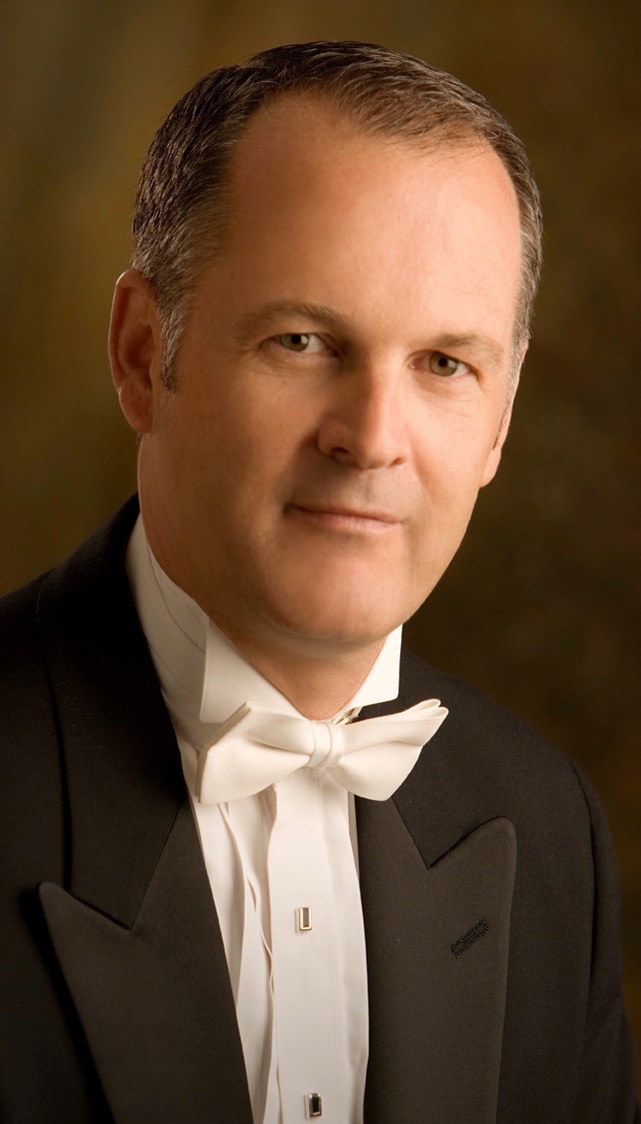
-
Barlow Bradford, conductor
(Salt Lake City)
Dr. Barlow Bradford has distinguished himself as a conductor, composer, arranger, pianist, organist, and teacher. He co-founded the Utah Chamber Artists in 1991 and has led that organization to international acclaim for its impeccable nuanced performances and award-winning recordings—including an INDIE from NAIRD (National Association of Independent Record Distributors & Manufacturers) for the CD Welcome All Wonders, released in 1996 on the BWE label. Utah Chamber Artists was featured on NPR’s “The First Art,” a program dedicated to choral music, and performed as a featured ensemble with the Boston Pops and Utah Symphony. Under his baton, Utah Chamber Artists toured Israel with the Israel Chamber Orchestra, performed as the guest choir at the American Choral Directors Association (ACDA) national convention, and joined the Mormon Tabernacle Choir on their national television broadcast. Dr. Bradford’s focused, energetic conducting style led to his appointment as music director of the Orchestra at Temple Square in Salt Lake City and associate director of the Mormon Tabernacle Choir. Prior to that, he was director of orchestras at the University of Utah, where he remains on faculty.
-
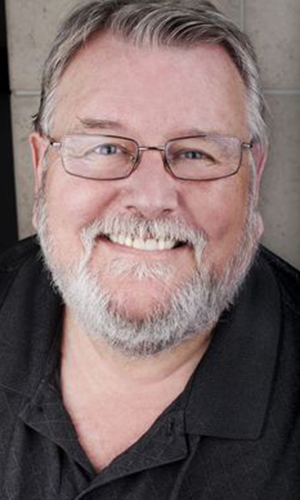
-
Donald Brinegar, conductor
(Los Angeles)
Donald Brinegar is a choral director, tenor soloist, voice instructor, educator and master class clinician. He is Professor Emeritus of Music and Choral Studies at Pasadena City College and conducts the Donald Brinegar Singers, a community choral ensemble in Pasadena. He is also Director of Choruses for the Pasadena Symphony and Pops. He has been Adjunct Professor of Voice at Cal State Los Angeles and Pomona College, and Visiting Professor of Graduate Choral Conducting and Voice at the University of Southern California. During the summers he is Associate Director of the Cal State Los Angeles masters program in choral conducting, a program that he co-founded. He has been a featured soloist with Robert Shaw, Helmuth Rilling, Roger Wagner, Gerard Swartz, Murray Sidlin, Howard Swan, Charles Hirt, Rod Eichenberger, William Hall and with numerous music festivals, orchestras and opera associations. He has worked with Marvin Hamlisch, Michael Feinstein, Grant Cooper, Henry Mancini, Barry Manilow, The Los Angeles Philharmonic Orchestra, John Delancie, and The Chieftains. His choirs have given performances for the American Choral Directors Association, California Music Educators (MENC), Choral Conductors Guild, the Los Angeles Music Center, and the Hollywood Bowl, and have twice performed in Carnegie Hall. Maestro Brinegar has performed throughout North America, Europe, Australia, New Zealand, and Japan.
-

-
Arianne Brown, soprano
as Angelina (Washington, DC)
Cantor Arianne Brown, of Adas Israel Congregation in Washington DC, was invested as a Hazzan and received a Master of Arts in Sacred Music from the Jewish Theological Seminary. She holds a Bachelor of Music Education/Voice degree from Rutgers University. Cantor Brown served Sinai Temple in Los Angeles prior to coming to DC. Fluent in Hebrew and Yiddish, she is an expert Torah and Megilah reader, pianist, composer, arranger, and theater director. A renowned specialist in Yiddish music, Arianne performed in off-Broadway productions of the Folksbiene Yiddish Theater and has appeared at Carnegie Hall, Safra Hall, Disney Hall, the Krakow Jewish Music Festival, and Warsaw’s Ida Kaminska State Theatre. She sang the national anthem at Dodger Stadium and the Kodak Theater for President Obama’s Jewish Heritage address and for Prime Minister Netanyahu. Theater roles include Lili in Carnival, Hodel in Fiddler on the Roof, Hope in Anything Goes, Luisa in The Fantasticks, and Zorah in Ruddigore. Opera credits include roles in Carmen, The Marriage of Figaro, and Amelia Goes to the Ball. Arianne has a solo recording entitled Eternal Flame – A Yiddish Love Story, as well as a CD by her women’s trio, Ashira, entitled Suddenly Spirited, available at www.cantorari.com. Arianne was proud to produce and perform in the premiere of highlights from Circular 14 for Adas Israel’s Garden of the Righteous ceremony. Arianne is married to Rabbi Randy Brown and is the proud Ima of two little boys.
-
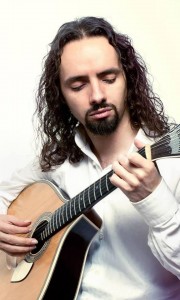
-
Pedro da Silva, Portuguese guitar
(New York and Los Angeles)
Pedro da Silva is the foremost exponent of the Portuguese guitar in the United States. He is the Music Director of the Manhattan Camerata, a New York-based ensemble that combines classical music with elements from different cultures. His compositions and performances have taken him to some of the most prestigious concert halls in the world, including Carnegie Hall, Lincoln Center, The Kennedy Center, the Palace of Versailles, Centro Cultural de Belém and the Monserrate Palace in Portugal, Auditorio Silvestre Revueltas in Mexico City, the Kew Royal Palace in London, and many others. He recorded guitar for two films by Oscar-winning director Michel Gondry (Be Kind Rewind and Interior Design from the “Tokyo” trilogy) and composed scores for seven films, including Richard Témtchine’s film How to Seduce Difficult Women. He is a Professor of Composition and Classical Guitar at New York University, and has given master classes and lectures internationally, including a sold out course at New York’s Museum of Modern Art. Pedro da Silva holds a doctorate in composition from the Manhattan School of Music. He is the 2015 winner of the prestigious ASCAP Plus Award from the American Society of Composers, Authors, and Publishers.
-
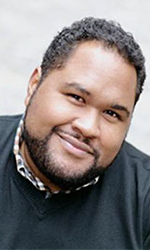
-
Ashley Faatoalia, tenor
as Salazar (Los Angeles)
Ashley Faatoalia is a native of Southern California. Noted for his soaring tenor and warm stage presence, his most recent engagements with LA Opera include: Mozart Opera Tales and Summertime at City of Hope. Other recent engagements include Marco Polo in Invisible Cities with The Industry, his debut performance with San Francisco Opera as The Crab Man in Porgy and Bess, and his debut performance with San Francisco Lyric Opera as Don Ottavio in Don Giovanni. Mr. Faatoalia has also performed with the Los Angeles Philharmonic at the historic Hollywood Bowl. He studied vocal performance with his teacher and mentor, Dr. Peter Atherton at Chapman University. As a member of Opera Chapman, Mr. Faatoalia performed the roles of Tamino in The Magic Flute, Ferrando in Così fan Tutte, Basilio in The Marriage of Figaro, and A Sailor in Dido and Aeneas. He was honored by the Pasadena Opera Guild in their scholarship competition for his continued success as a young artist. Other awards include: The Opera 100 Competition, The NAACP-ACTSO Competition, The BEAM Foundation, The William Grant Still Performing Arts Society Competition, district finalist for the Metropolitan Opera Competition, and Chapman University’s Bramledge Award for outstanding performance in an opera.
-
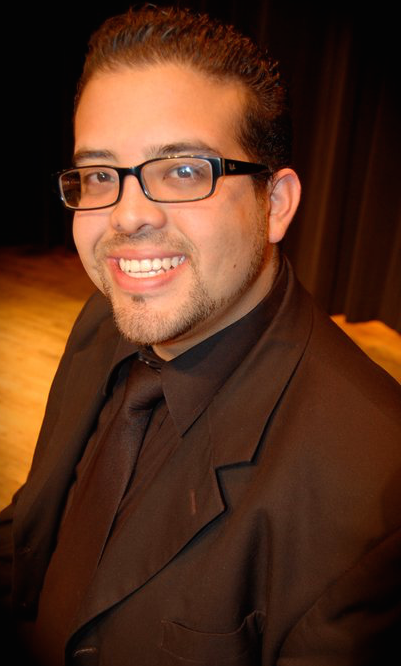
-
Jonathan Frias, tenor
as Pedro Nuno (Los Angeles)
Jonathan Frias is a multifaceted musician. He was the tenor soloist in the world premiere of Manuel Garcia’s Mass in D Major and Salve Regina, performing in the composer’s hometown of Seville, Spain. In addition to being a singer, he plays the string bass with various jazz ensembles (2230 Trio, Phat Cat Swinger) and is the choral director at Citrus Hill High School. He studied voice under Dr. Andrew Crane and classical string bass under Ana Maria Maldonado. He played string bass at the Surin International Folklore Festival and the Thailand International Jazz Conference in 2009, 2010, and 2011. He received his Master of Music degree in choral conducting from California State University Los Angeles in 2015 and two Bachelor of Arts degrees from California State University San Bernardino in Music Education and Music Technology, with a minor in Jazz Studies, in 2010.
-

-
Katherine Giaquinto, soprano
as Andrée (Los Angeles)
Soprano Katherine Giaquinto began her performing career as a professional actress in Canadian film and television. Lauded as a “smart singer” with a “gorgeous, clear lyric soprano voice” (Operaworld.net), Ms. Giaquinto recently made a splash with LA Opera when she stepped in with two weeks’ notice for the role of Rosina in Paisiello’s Il barbiere di Siviglia under the baton of Maestro James Conlon. She made her LA Opera debut earlier in 2015 in their critically acclaimed production of The Ghosts of Versailles. In November of 2015, she sang the role of the difficult Prima Donna in Donizetti’s Viva la mamma with Pacific Opera Project. Previous roles with Pacific Opera Project include Susanna in Le nozze di Figaro, Musetta in La Bohème and Fiordiligi in Così fan tutte. In 2014, Ms. Giaquinto sang Stella in a critically acclaimed production of Previn’s A Streetcar Named Desire with Union Avenue Opera. She received her Master of Music degree from the Cincinnati College-Conservatory of Music, and her Bachelor of Arts in Music from UCLA, and is a graduate of the American Academy of Dramatic Arts.
-
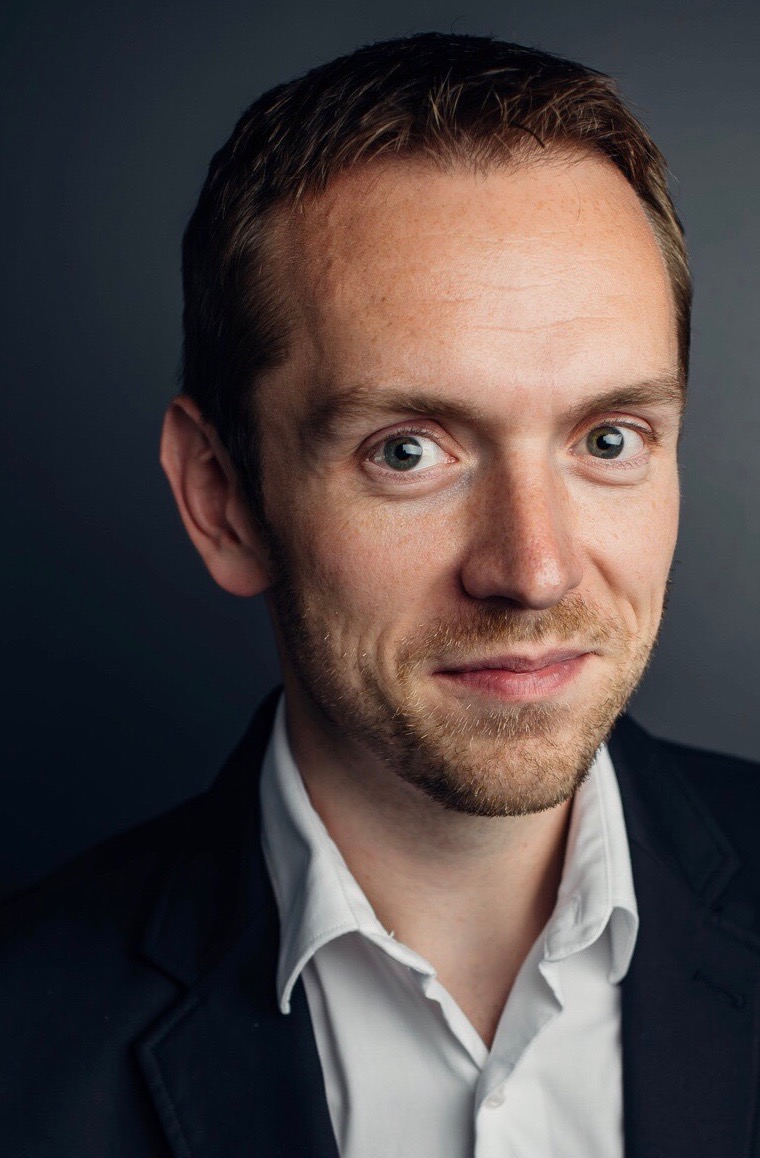
-
Adam Griffiths, tenor
as Salazar (Salt Lake City)
Tenor Adam Griffiths is active as a performer, conductor, pianist, composer, and teacher. With the Ohio Light Opera company he performed the lead role of “Prince Karl Franz” in The Student Prince. With the Desert Star Playhouse he played the title role in Ebenezer Scrooge. He has travelled the world performing with the University of Utah Singers and Salt Lake Vocal Artists, and spent three years performing with the prestigious men’s septet “Consortium.” Griffiths earned his Bachelor’s Degree in Music Education from the University of Utah, and subsequently taught choir and AP Music Theory at Alta High School. He is currently pursuing a Master’s Degree in Vocal Performance at the University of Utah. He recently played “King Kaspar” in Menotti’s Amahl and the Night Visitors and “Bob Cratchit” in a new opera A Christmas Carol with the U of U Lyric Opera Ensemble, and will sing the title role in Bernstein’s Candide in 2018. Griffiths has soloed in many concert works, including Dan Forrest’s Requiem for the Living, Robert Ray’s Gospel Mass, Handel’s Messiah, and David Zabriskie’s The Testament of Paul (Christ). He was recently selected as one of three winners of the U of U Concerto Competition, and will solo with the U of U Philharmonia in 2018. Griffiths has a passion for teaching and maintains a full studio of private voice students.
-
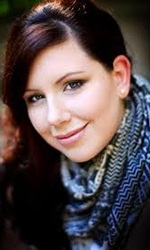
-
Marina Harris, Soprano
as Angelina (New York and Los Angeles)
Marina Harris has been praised by The San Francisco Chronicle for her “knockout combination of vocal power and expressive eloquence.” Recently, Ms. Harris garnered national attention as a last-minute replacement for Patricia Racette as Elena in Boito’s Mefistofele, the season opener for the San Francisco Opera. Her roles include Tatiana in Eugene Onegin, Cio-Cio San in Madama Butterfly, Ariadne in Ariadne auf Naxos, Miss Jessel in Benjamin Britten’s The Turn of the Screw, and Arabella in scenes from Richard Strauss’ Arabella. The San Francisco Chronicle said about that performance, “Sopranos who can sing Strauss’ music this well are rare, and to be treasured.” A graduate of the prestigious Merola Opera Program and the Music Academy of the West, she is the recipient of the 2015-16 George London Foundation Vienna Prize, a 2015 Grant Recipient of the Gerda Lissner Foundation, and was the only American finalist in the 2015 International Wagnerstimmen Competition in Karlsruhe.
-
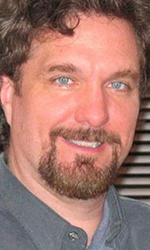
-
Stephan Kirchgraber, bass
as Rabbi Kruger (Los Angeles and Washington, DC)
Stephan Kirchgraber made his debut with the Miami Opera, after studies at the University of Illinois and in Munich, returning to Miami for principal roles in Macbeth, Norma, Turandot, and Alberto Franchetti’s Cristoforo Colombo. In recent seasons, he sang at the Phoenicia International Festival of the Voice in Rigoletto and Verdi’s Requiem, and in Fidelio with the Shippensburg Festival Symphony and Chorus. He appeared in Aida with the Opera de Puerto Rico and in Andrea Chenier with Culturarte de Puerto Rico, released on DVD. Mr. Kirchgraber made his European debut in Die Meistersinger at the Festival dei due Mondi in Spoleto, toured with the Philharmonic Orchestra of Pecs in Beethoven’s Ninth, and appeared in Salome at the Opernhaus Zurich. He also appeared with the opera companies of Augusta, Baltimore, Orlando, Palm Beach, Pittsburgh, Tampa, and Utah, and has toured with the New York City Opera. In 1998, he received the Robert M. Lauch Memorial Grant from the Wagner Society of New York.
-
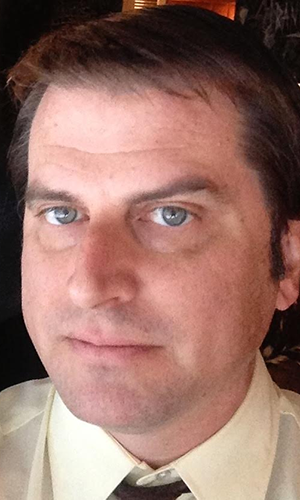
-
John Krovoza, Cello
(Los Angeles)
John Krovoza has been busy in Los Angeles and abroad as an acoustic and electric cellist since 1990. In 2006 he toured as a band member on the Dixie Chicks “Accidents and Accusations” tour. That same year he appeared in the credits of Little Miss Sunshine for his solo cello work in the film. From 1994 to 1997 he toured extensively with Yanni, including two U.S. tours as well as tours across Asia, Europe and Australia. He has also toured as principal cellist on both the Michael Crawford Tour (U.S.) and Percy Faith Tour (Japan). A 2001 feature on the single Overcome by the band “Live” has brought him appearances on The Tonight Show, MTV Europe and Much Music, Canada. On any given week, John Krovoza is on a recording project somewhere in Los Angeles, and has hundreds of album credits.
-
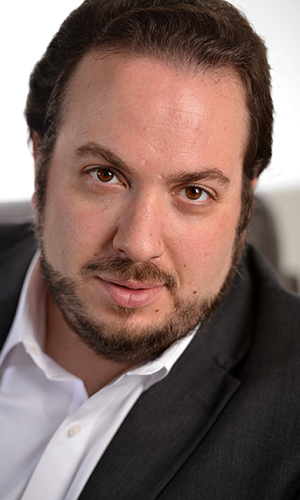
-
E. Scott Levin, Bass-baritone
as José António (Los Angeles)
E. Scott Levin has been described as having a “smooth, buttery voice” and “incredibly sharp timing.” In 2015, he made his LA Opera debut as Babayan (Bartolo) in Figaro! (90210), and subsequently played the role of Dr. Spinelloccio in Gianni Schicchi, starring Placido Domingo. He has also sung with the Long Beach Opera, Opera Santa Barbara, Redlands Opera Theater, Center Stage Opera, and OperaWorks. Since 2002, Mr. Levin has sung in over twenty productions with Union Avenue Opera in Saint Louis as well as in productions of Pacific Opera Project, Southern California’s most innovative opera company. He earned his B.A. from Washington University in St. Louis and his Graduate Certificate in Vocal Performance from the University of Southern California Thornton School of Music.
-

-
Robert MacNeil, tenor
as Aristides de Sousa Mendes (Los Angeles)
Robert MacNeil has been praised by The Los Angeles Times for a voice that is “clarion” and “clear.” After his San Francisco Opera debut as the High Priest of Neptune in Mozart’s Idomeneo, he returned to perform in its productions of Salome, The Marriage of Figaro and Werther, with Opera News proclaiming that he “sang with panache.” Mr. MacNeil recently performed with LA Opera in Lohengrin, after previous appearances in The Stigmatized, Fidelio, Il Trovatore, Der Rosenkavalier, Tannhäuser, La Bohème and Il Tabarro. He made his debut with the famed Ojai Festival under Kent Nagano in Carl Orff’s Die Kluge and recorded the role of Martin in Aaron Copland’s opera The Tender Land, which was released by Koch International Classics. He has been a soloist in more than sixty performances of Handel’s Messiah. He also soloed with the Mormon Tabernacle Choir in performances of Elijah, and in Orff’s Carmina Burana with the Central Union Philharmonic in Beijing. He made his Carnegie Hall debut in Benjamin Britten’s The World of the Spirit.
-
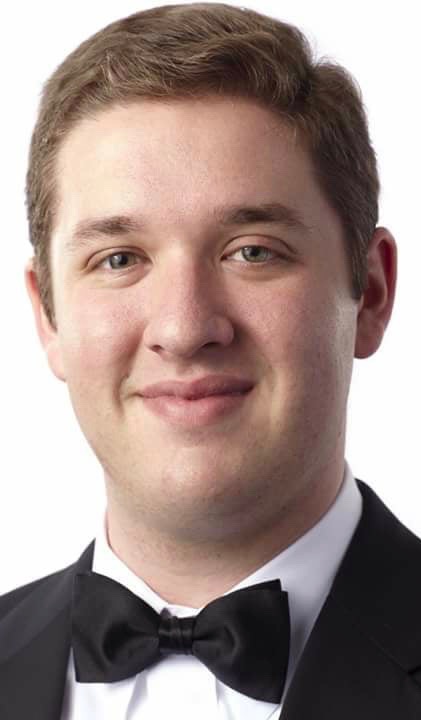
-
Andrew Neumayer, baritone
as Rabbi Kruger (Salt Lake City)
Baritone Andrew Neumayer is a versatile performer who has performed in many venues in the Western United States and internationally in Germany, Austria and China, both as a soloist and choral artist. He was recently seen as Rambaldo in the University of Utah’s production of La rondine. He has performed many leading roles in operas including Dulcamara and Belcore in L’elisir d’amore by Donizetti, Lescaut in Manon by Massenet, and Count Almaviva in Le nozze di Figaro by Mozart, among others. He is a graduate student in vocal performance at the University of Utah, where he is the baritone in the Graduate Vocal Quartet. He has performed and recorded with the Utah Symphony Chorus, the early music group Sound of Ages, and the Brigham Young University Singers and Concert Choir.
-
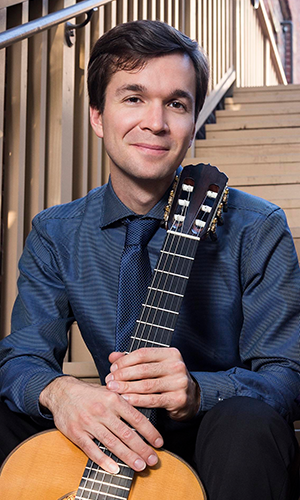
-
Cameron O’Connor, Spanish and electric Guitars
(Los Angeles)
Cameron O’Connor’s recent highlights include a performance at the New World Symphony in Miami (for which the South Florida Classical Review noted that he was “especially effective in the quick and diabolical figures”); appearing as a guest artist at the Aspen Music Festival and School; performing with the new music group Firebird Ensemble; playing banjo, mandolin, and guitar for a performance with the Colburn Conservatory Orchestra conducted by John Adams; performing with Michael Tilson Thomas for Lukas Foss’ Phorion; and appearing under the baton of Chinese composer Tan Dun in his Eastern-tinged Concerto for Six, for which The New York Times reviewed that “O’Connor fluttered on his guitar strings in a manner reminiscent of a pipa player’s technique.” He has been a top prizewinner in nine international competitions, and his playing has been featured in films, including James Franco’s Don Quixote, and on American Public Media’s Performance Today radio broadcasts, and his articles and music are published by LACG Editions. O’Connor also performs regularly in musical theatre and new music productions on electric guitar, banjo, and mandolin. He is a graduate of CSU Northridge, The Juilliard School, and the USC Thornton School of Music, which named him its Outstanding Graduate of 2015.
-
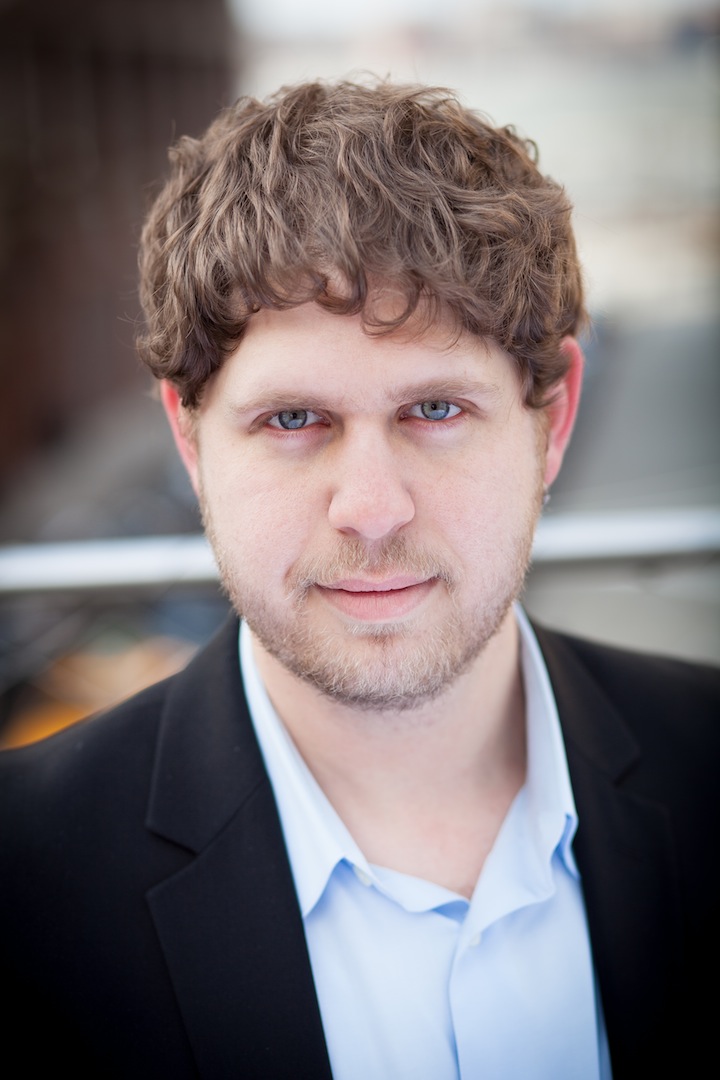
-
Gilad Paz, Tenor
as Salazar (New York)
Gilad Paz commands the stage “with great feeling whether being imperious or amorous,” and brings new life to every role with his energetic and nuanced performances. His latest performances include, among others, the role of Tony in West Side Story , the role of Coach in the newly-written BOUNCE: The Basketball Opera, Spalanzani & Nathanaël in Les contes d’Hoffmann, and the role of Rabbi Azrael in a premiere presentation of Joel Mandelbaum’s The Dybbuk. He is the creator and producer of OPROCK℠ — a unique concert concept that is currently being booked with orchestras throughout the U.S. The 2015-16 season highlights included Mr. Paz’s Long Island debut performance as tenor soloist in Carmina Burana, and singing the role of Tom Rakewell in Stravinsky’s The Rake’s Progress under the baton of Maestro Tito Muñoz. In the 2014-15 season Mr. Paz made his Houston debut, singing the tenor solo in Orff’s Carmina Burana. In New York City he has sung Azaël in Debussy’s L’enfant prodigue the Evangelist in Bach’s St. John Passion, and the Mayor in Albert Herring. His concert solos include Händel’s Messiah, Judas Maccabaeus, Missa Solemnis, Mozart’s Coronation Mass K.317, Bernstein’s Songfest, Weill’s Mahagonny Songspiel, and Beethoven’s Ninth Symphony. He also appeared as soloist in both St. Patrick’s Cathedral and the Stern Auditorium at Carnegie Hall.
-

-
Michelle Pedersen, Soprano
as Angelina (Salt Lake City)
Michelle Marie Pedersen has appeared as a soloist throughout the Pacific Northwest, and performed roles on both the operatic and musical theater stages. Her credits include Mother (Amahl and the Night Visitors), Susannah (Le Nozze di Figaro), Mabel (Pirates of Penzance), Tisbe (La Cenerentola), Olive Ostrovsky (25th Annual Putnam County Spelling Bee), Mimi Marquez (RENT), Gertrude McFuzz (Seussical the Musical), and Anne (A Little Night Music). Ms. Pedersen has a Bachelors of Arts Degree in both Vocal Performance and Music Education from Oregon State University. She is currently pursuing her Masters of Music in Vocal Performance at the University of Utah, where she studies and coaches with Dr. Robert Breault and Jeffrey Price. Ms. Pedersen will be performing the role of Old Lady in the School of Music’s upcoming 2018 production of Candide.
-
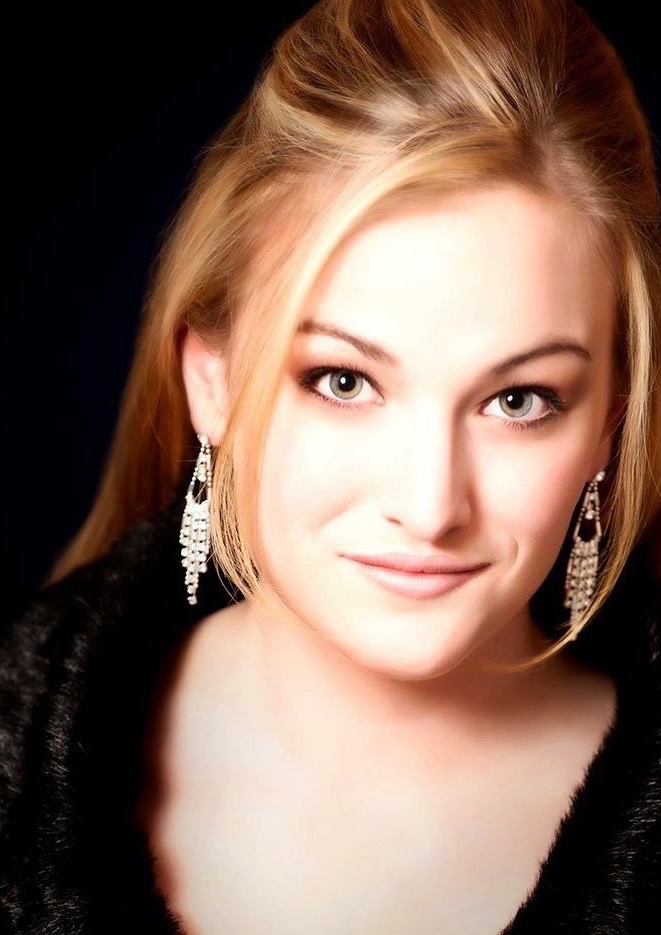
-
Elizabeth Peters, Soprano
as Andrée (Salt Lake City)
Elizabeth Peters, lyric coloratura soprano known for her beautiful, clear, bell-like extension and rich middle voice, has appeared on stage in opera and musical theater including roles in The Magic Flute (Queen of the Night), Iphigénie en Tauride (Diana), and Maury Yeston’s Phantom (Christine). Most recently, she was the soprano soloist for Handel’s Messiah with the Murray Symphony Orchestra. She has also appeared as a soloist with the University of Utah Philharmonia, BYU-Idaho, and Kearney Area symphony orchestras. Peters received her BM in Vocal Performance from BYU-Idaho, studying under Dr. Jon Linford. In 2013, she received her MA from the University of Nebraska-Kearney as a student of Dr. Anne Foradori, and placed in the West Central regional auditions of the National Association of Teachers of Singing. She served as the Music Department Chair and tenured Voice Faculty for Mid-Plains Community College-North Platte, Nebraska from 2010-17. In 2016, she performed the role of Despina (Cosi fan tutte) at the Atlantic Music Festival, where she continued her vocal studies with Dr. Carla Rae Cook. She is currently pursuing her DMA in Voice Performance from the University of Utah School of Music, where she is the soprano in the Graduate Vocal Quartet, studying and coaching with Dr. Robert Breault and Jeffrey Price. In 2018, she will be performing in the University of Utah’s production of Bernstein’s Candide (Cunégonde).
-
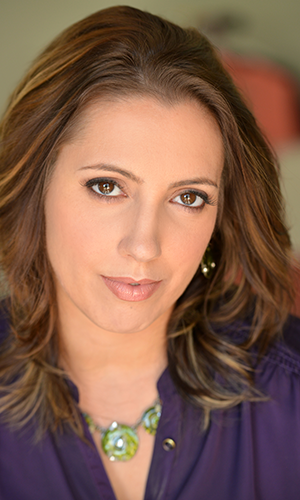
-
Ariel Pisturino, Soprano
as Isabel (Los Angeles)
Ariel Pisturino was hailed as “simply exquisite” by Fanfare Magazine. She made her professional debut in 2010 with Long Beach Opera as Nancy T’ang in John Adams’ Nixon in China. Ms. Pisturino collaborates regularly with composers in southern California and sings with new music ensembles including the unSUNg Concert Series, Chamber Opera Players of LA, and the Spacious Visions Concert Series. She was a featured soloist on the Delos recording of Terrain of the Heart: Song Cycles of Mark Abel, released in 2014. She recently performed in the critically acclaimed production of HOPSCOTCH by the experimental opera company, The Industry. The Los Angeles Times described the mobile opera as “one of the most audacious cultural events” of 2015. Upcoming engagements are with Bach in the Subways at LA’s Union Station and as Donna Elvira in Don Giovanni with Redlands Opera Theater. She earned a Master of Music degree from the University of Southern California and completed the advanced artist program at OperaWorks.
-
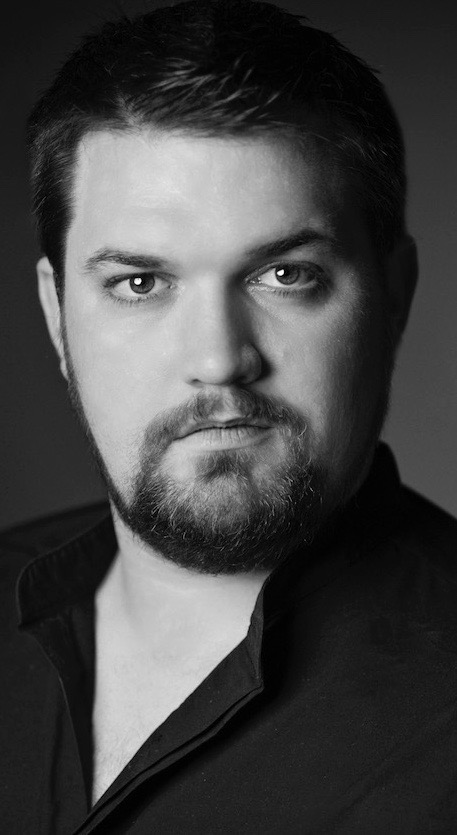
-
David Sauer, Tenor
as Aristides de Sousa Mendes (Salt Lake City)
David Sauer has won accolades from The New York Times, Opera News, and The Salt Lake Tribune, among others. Recent engagements include Rodolfo in Puccini’s La Boheme at The Montefeltro Festival in Italy, Ruggero in Puccini’s La rondine, Alfredo in Verdi’s La traviata, again in Italy, and the tenor soloist in both Beethoven’s 9th Symphony and Choral Fantasy with the American West Symphony. Past roles include Eisenstein (Die Fledermaus), Tenor Soloist (Verdi Requiem), Prince Charmant (Cendrillon), Council (Trial by Jury), Pollione (Norma), Kaspar (Amahl and the Night Visitors), and Paco (La vida breve). Mr. Sauer was a Rocky Mountain Region finalist and Utah District winner in the 2014 Metropolitan Opera National Council Auditions, and has been a regular participant in Dolora Zajick’s Institute for Young Dramatic Voices. He holds a Master of Music degree from the Manhattan School of Music and a Bachelors of Music from Brigham Young University, and is currently completing a doctoral degree at the University of Utah. He is on the faculty of Southern Utah University, where he teaches voice.
-
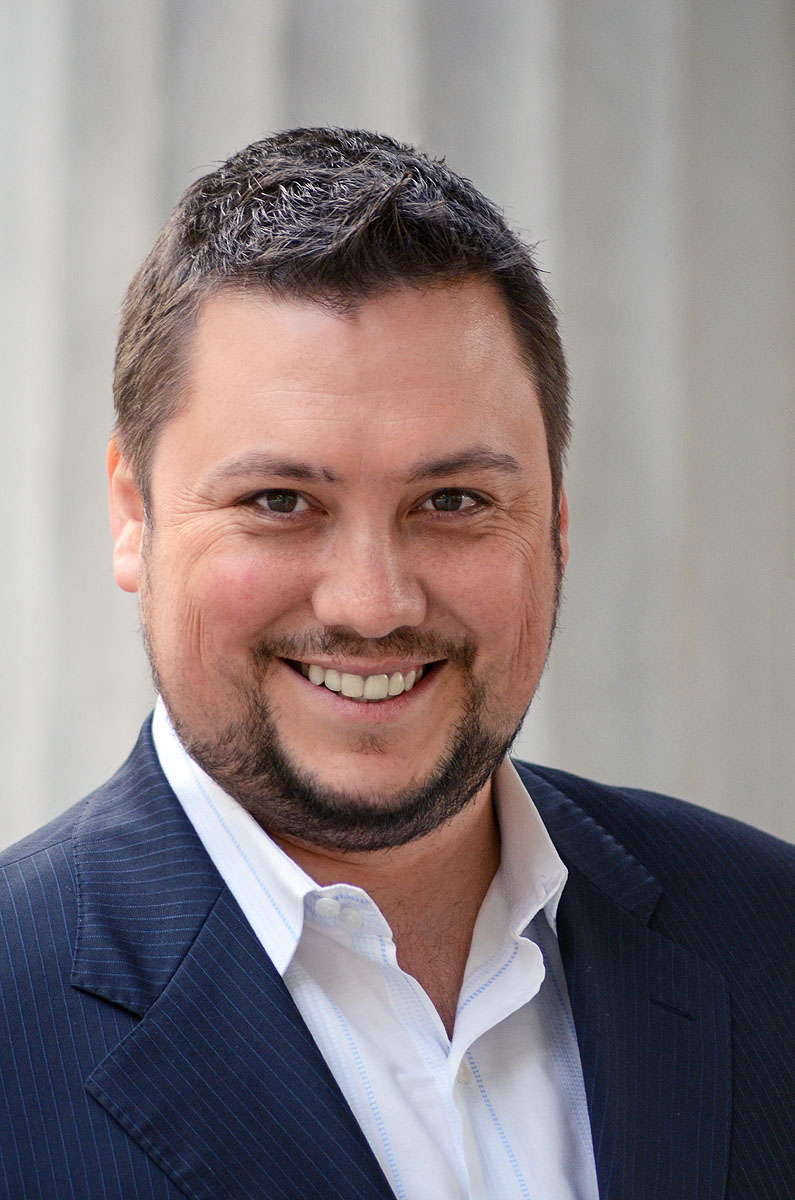
-
Benjamin Sloman, Tenor
as Aristides de Sousa Mendes (New York and Washington)
Benjamin Sloman is rapidly emerging as one of the most exciting young Australian tenors of his generation. He has studied in Italy and the United States under the tutelage of Gioacchino Li Vigni, Nicola Martinucci, and Salvatore Fisichella, and in 2013 and 2016 was awarded fellowships from the Mediterranean Opera Studio (Italy) for intensive study with opera luminaries Marcello Giordani, Pietro Ballo, Mariella Devia, Jennifer Larmore, and Giuseppe Filianoti. Early professional engagements included The Duke (Rigoletto) with the New Jersey Association of Verismo Opera under the auspices of Lucine Amara; Edgardo (Lucia di Lammermoor), Riccardo (Un Ballo in Maschera) and the title role in Roberto Devereux at the Lincoln Center; Alfredo (La Traviata), Don Jose (Carmen), and Avito (L’amore dei Tre Re) for which Benjamin was hailed as “an absolutely splendid voice… so heroic and resonant” by ConcertoNet. In 2012 he became the first Australian to sing in a fully staged operatic production in New York’s Central Park in a leading tenor role when he sang the role of Pinkerton in Madama Butterfly with the New York Grand Opera. Reviews of that performance described him as possessing a “brilliant tenor voice with torrents of golden sound” (La Voce Italiana).



